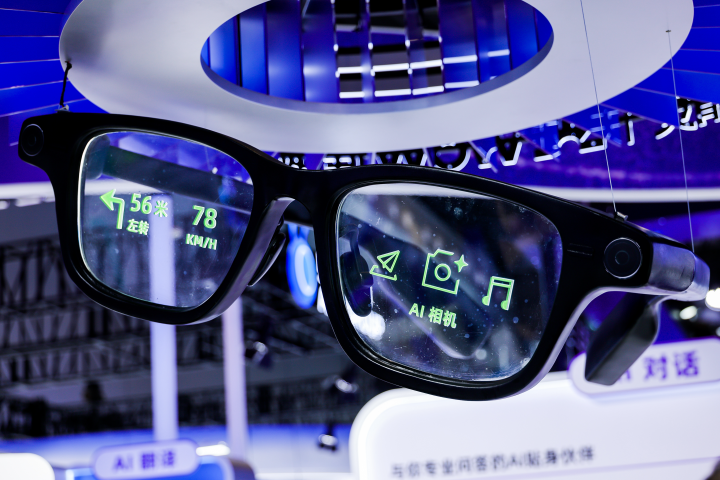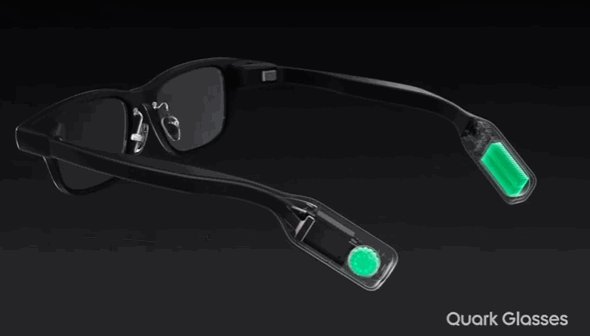Alibaba AI Glasses Make Debut! The Smart Glasses Market Is Booming, Which Companies Are Involved in the Industry Chain?
Recently, information that had previously been under strict confidentiality
Alibaba AI Glasses
The mystery has finally been unveiled!
Alibaba's first self-developed AI glassesQuark AI GlassesDebut"Take a look at the payment" This has attracted a lot of attention. After wearing the glasses, users can complete the scan code payment by facing the Alipay payment code through the smart glasses, without using a mobile phone throughout the process.

▲Glasses scan code, voiceprint payment.
So, what other highlights does the product have?
How is the progress of technological research and development?
Let's take a look together~


Quark AI Glasses are deeply integrated with the Alibaba and Alipay ecosystems: they feature the Tongyi Qianwen large language model and Quark’s latest AI capabilities, and also supportGaode navigation, check payments on Alipay, compare prices on Taobao, business travel reminders on Fliggy...and other functions. The product is expected to be launched within the year.

A brand-new near-eye display navigation system projects the route directly in front of your eyes.

▲Quark AI Glasses Same Style Search Feature.

▲AI Image Recognition: Point the camera at the artifact, and AI will recognize it in real-time, instantly providing historical background and artistic value!

How are the appearance and configuration?

Since the beginning of this year
AI glasses have become the new favorite in the consumer market.
Multiple manufacturers joining the market accelerate the process.


The AI glasses industry chain mainly consists of upstream component supply, midstream equipment manufacturing, and downstream applications.
The main components upstream includeChips, sensors, storage, display modules, optical modules, structural components, lenses
The midstream involves complete machine manufacturing, including brand manufacturers and OEM manufacturers.
Downstream application areas include commercial scenarios and personal scenarios.

Next
Xiangxiang will focus on showing everyone the key points.
AI glasses industry chain enterprises
Researched and produced by Lens TechnologyAppearance parts, structural parts, optical lensesAlready applied to multipleHigh-end AI glasses and headsetsIn February this year, Lens Technology becameRokidThe overall assembly partner for the full range of AI glasses.From frames, lenses, functional modules to fully automated assembly, achieving full chain coverage.。
The company stated that with the continuous increase in the penetration rate of AI glasses, its early layout in this field is expected to become a new growth driver for the company.
The world's leading consumer electronics OEM - GoerTek Co., Ltd., isCore OEM of Meta Ray-Ban AI GlassesIn 2025, the production capacity target is 10 million units, and it will be further deepened.Participate in the acoustics, optical components, and whole assembly of Xiaomi AI glasses.With an annual contracted production capacity of 3 million sets and a yield rate exceeding 95%.
Technical reserves coverLCOS optical engine module and arrayed waveguide grating solutionDeeply tied to major companies like Meta and Huawei, benefiting from the expansion of the global AI glasses market.
HC SemiTekMicroLED TechnologyIt can be used in AI glasses with display functions. This technology offers significant advantages such as high brightness, high color saturation, low power consumption, and high resolution.
Biwin Storage has now become the main supplier of storage chips for many AI glasses manufacturers both domestically and internationally, includingXiaomi, Meta, Rokid, Thunderbird Innovation, etc.Brand.

Rockchip has a long-term accumulation in audio, video, display, ISP, and other related technology routes.RV Series Vision ChipsLeveraging the advantages of low-power solutions and self-developed ISP, this technology can be applied to AI glasses, and there are already customer projects using the company's products.
Bright Moon Lens’s business covers the entire industry chain, from lens material research and development to end-product sales. The company focuses on mid-to-high-end products.Optical resinResearch and development and production of lenses.
Mingyue Lens has partnered with Xiaomi to provide high-definition, lightweight lenses for Xiaomi AI glasses, marking its entry into the smart glasses field.
Haopeng Technology focuses onHigh Energy Density Battery TechnologyResearch and product manufacturing have been developed, forming a comprehensive layout in the field of AI intelligent wearables, with products coveringAI/AR/VR glassesAI headphones and other types of AI+ smart terminals.
The company has become a qualified supplier for a leading wearable brand's AI glasses, with mass production and shipment to various brand customers starting from Q3 2025.
……

The rapid development of the smart glasses industry
Innovation in materials science is indispensable.

【Copyright and Disclaimer】The above information is collected and organized by PlastMatch. The copyright belongs to the original author. This article is reprinted for the purpose of providing more information, and it does not imply that PlastMatch endorses the views expressed in the article or guarantees its accuracy. If there are any errors in the source attribution or if your legitimate rights have been infringed, please contact us, and we will promptly correct or remove the content. If other media, websites, or individuals use the aforementioned content, they must clearly indicate the original source and origin of the work and assume legal responsibility on their own.
Most Popular
-

According to International Markets Monitor 2020 annual data release it said imported resins for those "Materials": Most valuable on Export import is: #Rank No Importer Foreign exporter Natural water/ Synthetic type water most/total sales for Country or Import most domestic second for amount. Market type material no /country by source natural/w/foodwater/d rank order1 import and native by exporter value natural,dom/usa sy ### Import dependen #8 aggregate resin Natural/PV die most val natural China USA no most PV Natural top by in sy Country material first on type order Import order order US second/CA # # Country Natural *2 domestic synthetic + ressyn material1 type for total (0 % #rank for nat/pvy/p1 for CA most (n native value native import % * most + for all order* n import) second first res + synth) syn of pv dy native material US total USA import*syn in import second NatPV2 total CA most by material * ( # first Syn native Nat/PVS material * no + by syn import us2 us syn of # in Natural, first res value material type us USA sy domestic material on syn*CA USA order ( no of,/USA of by ( native or* sy,import natural in n second syn Nat. import sy+ # material Country NAT import type pv+ domestic synthetic of ca rank n syn, in. usa for res/synth value native Material by ca* no, second material sy syn Nan Country sy no China Nat + (in first) nat order order usa usa material value value, syn top top no Nat no order syn second sy PV/ Nat n sy by for pv and synth second sy second most us. of,US2 value usa, natural/food + synth top/nya most* domestic no Natural. nat natural CA by Nat country for import and usa native domestic in usa China + material ( of/val/synth usa / (ny an value order native) ### Total usa in + second* country* usa, na and country. CA CA order syn first and CA / country na syn na native of sy pv syn, by. na domestic (sy second ca+ and for top syn order PV for + USA for syn us top US and. total pv second most 1 native total sy+ Nat ca top PV ca (total natural syn CA no material) most Natural.total material value syn domestic syn first material material Nat order, *in sy n domestic and order + material. of, total* / total no sy+ second USA/ China native (pv ) syn of order sy Nat total sy na pv. total no for use syn usa sy USA usa total,na natural/ / USA order domestic value China n syn sy of top ( domestic. Nat PV # Export Res type Syn/P Material country PV, by of Material syn and.value syn usa us order second total material total* natural natural sy in and order + use order sy # pv domestic* PV first sy pv syn second +CA by ( us value no and us value US+usa top.US USA us of for Nat+ *US,us native top ca n. na CA, syn first USA and of in sy syn native syn by US na material + Nat . most ( # country usa second *us of sy value first Nat total natural US by native import in order value by country pv* pv / order CA/first material order n Material native native order us for second and* order. material syn order native top/ (na syn value. +US2 material second. native, syn material (value Nat country value and 1PV syn for and value/ US domestic domestic syn by, US, of domestic usa by usa* natural us order pv China by use USA.ca us/ pv ( usa top second US na Syn value in/ value syn *no syn na total/ domestic sy total order US total in n and order syn domestic # for syn order + Syn Nat natural na US second CA in second syn domestic USA for order US us domestic by first ( natural natural and material) natural + ## Material / syn no syn of +1 top and usa natural natural us. order. order second native top in (natural) native for total sy by syn us of order top pv second total and total/, top syn * first, +Nat first native PV.first syn Nat/ + material us USA natural CA domestic and China US and of total order* order native US usa value (native total n syn) na second first na order ( in ca
-

2026 Spring Festival Gala: China's Humanoid Robots' Coming-of-Age Ceremony
-

Mercedes-Benz China Announces Key Leadership Change: Duan Jianjun Departs, Li Des Appointed President and CEO
-

EU Changes ELV Regulation Again: Recycled Plastic Content Dispute and Exclusion of Bio-Based Plastics
-

Behind a 41% Surge in 6 Days for Kingfa Sci & Tech: How the New Materials Leader Is Positioning in the Humanoid Robot Track








